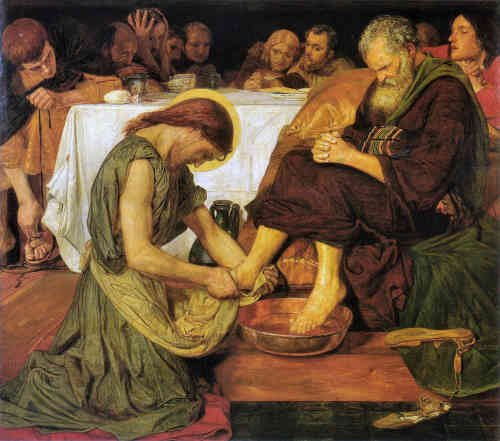
I have not read The Holy Thursday Revolution by Beatrice Bruteau – so this is not a review. But the contrast between domination, exploitation, accumulation, and force on the one hand as the chief paradigm in today’s world and Jesus’ modelling of communion, self-giving, and foot-washing on the other as exemplified in quotes from the book, encourages me to reflect; and also to consider reading this book. For now, here are some quotes:
The theme that I believe is basic to many of our political ills is domination. We are all familiar with domination. We see it in the way decisions are made in our families; in the way orders are given at work; in the way social life is structured in our city by gender, race, and wealth; in the way our industry or profession relates to its competitors or its market or its clientele; in the way governmental agencies function. . . . Domination is a relation that does not work the same in both directions. One commands, the other obeys. One shows respect, the other accepts it but does not return it. One gains privileges from which the other is excluded.
source
Under the Domination Paradigm, people are encouraged to think of themselves as identified by their descriptions and to see themselves as real insofar as they are distinct from others. . . . “I am I by virtue of being not-you.” So defined, people feel the insufficiency of their being, which is always vulnerable, always at risk. Consequently, people are insecure and anxious. Strongly pressed to preserve and enhance what being they have, people are easily tempted to believe that helping others may hurt themselves and that hurting others may be the best way to help themselves. After all, the others are “others,” and our first priority is ourselves. “My” well-being has to take precedence over “yours.”
In the Jesus Movement, several things happen that undercut these views and feelings. First, Jesus offers people unconditional positive regard. He gives full attention, sympathetic support, respect, and something else. The something else is that he does not interact on the basis of one’s social description. In by-passing the description, he is going to something deeper and more real in the person. When he turns his unconditional positive regard on this deeper self beyond the descriptions, that self has the opportunity to wake up, to experience itself. When it does, it discovers itself as full of being; it no longer feels deficient. . . .
Second, Jesus explains to people that each person is a child of God. . . . God does not play favorites. God loves all equally. Children of God are supremely safe in this love (but not protected in the world), and children of God are themselves capable of this kind of loving. . . .
Third, Jesus gathers people into communities in which . . . each person does the same thing that Jesus originally did: loving another person on the level beyond any description, beaming full attention (with all one’s heart, soul, mind, strength) of positive regard. This can awaken the sense of selfhood in one who has not yet known it, and in this way the community expands. . . . [In the community] all people are absolutely equal and each is absolutely unique. The sharing within the community is thus richly textured and very creative. Being unified, loving, and creative, the community is the “outreach” of God, the very Presence of God as world.
We now have what we may call a Communion Paradigm. . . . Here I am I by virtue of being in-you/with-you/for-you, not outside and not against—not even separate.
source
Jesus gathers people into communities in which the mutual recognition as children of God is the foundation for social interaction, and the social feeling is mutual affirmation. In the community, each person does the same thing that Jesus originally did: loving another person on the level beyond any description, beaming full attention (with all one’s heart, soul, mind, strength) of positive regard. This can awaken the sense of selfhood in one who has not yet known it, and in this way the community expands…
source
Jesus had a fundamental vision-faith that all people are ‘children of God.’ This is the theological perspective of his ‘program,’ on which everything else rests. I am supposing that he took this seriously, more or less literally, as the Kabbalah does in teaching that each person has an uncreated soul that is actually a continuation of the Divine Life itself. When he met a person, therefore, he really believed that God was somehow present in that person, so he looked for that presence through all the overlying contradictions to it, until he found it. Then he addressed himself to that point in the person. As the Hindus also say, the divine in him saluted the divine in the other. When anyone does that, it tends to awaken the divine in the other, who is thus invited to speak from that place in return.


